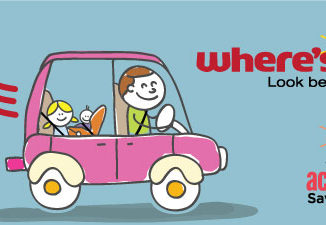
People planning to nap, meditate, play video games; but experts say not so fast–distracted driving not going away anytime soon
A recent national survey commissioned by Erie Insurance, and conducted online by Harris Poll among nearly 3,000 licensed U.S. drivers, finds almost six in 10 (59 percent) think that self-driving cars will eliminate the problem of distracted driving. Two-thirds of men think this, compared with just over half of women (66 percent to 52 percent, respectively).
But while it might be nice to completely kick back and let the car do the driving, experts say the time for that is likely a long way off.
“The term ‘self-driving car’ suggests I can hop in my car, enter a destination and have it take me from point A to point B. But that car doesn’t exist yet,” said Adrian Lund, president of the Insurance Institute for Highway Safety.
With that in mind, and to coincide with Distracted Driving Awareness Month, Erie Insurance commissioned a national survey on licensed drivers’ attitudes toward self-driving cars and distracted driving.
“According to the National Highway Traffic Safety Administration, human error is a factor in 94 percent of car crashes. While we believe that fully autonomous vehicles will greatly reduce that number, it’s hard to predict how soon they will be widely available,” said Cody Cook, Erie Insurance vice president and product manager of ERIE’s auto department. “Current technology is going a long way to keep us safer on the road, but the last thing we want is for people to become over-confident as this technology continues to evolve. Unfortunately, our survey finds that many people are getting ahead of themselves—making plans for what they’ll do in the car instead of paying attention to the road.”
Sleeping promises to be a popular pastime in self-driving cars. Roughly half of licensed drivers (51 percent) say one of the biggest advantages of self-driving cars would be the ability to go longer distances without worrying about being drowsy while driving. About a fifth of licensed drivers (19 percent) say they’d sleep or nap while operating a self-driving car.
Other activities licensed drivers plan to do while operating a self-driving car include texting (34 percent); checking and sending emails (34 percent); reading (27 percent); and playing video games (11 percent). Ten percent said they’d meditate and perhaps surprisingly nearly 1 in 5 men ages 18-34 (18 percent) say they would engage in this activity.
Seven percent of licensed drivers say they would engage in romantic activities while operating a self-driving car, with men almost four times more likely to do this than women (11 percent vs. 3 percent, respectively).
When asked to write in what they would do, one licensed driver said they’d be “a nervous wreck,” while a few others said they would pray.
Licensed drivers also weighed in on the serious topic of driving under the influence. Whether it’s true or not is unknown, but 13 percent believe you wouldn’t get cited for DUI/DWI if you are under the influence when operating a self-driving car. One third (33 percent) believe that one of the biggest advantages of self-driving cars will be the ability to get home safely if under the influence of drugs or alcohol. A much smaller percentage of those 21+ (5 percent) say they would drink alcoholic beverages while operating a self-driving car.
Given that drivers are likely to still need to pay attention and be prepared to intervene when operating a self-driving car, the survey asked licensed drivers to suggest alternative names to “self-driving” or “autonomous” cars in order to communicate that the driver would still need to pay attention and be ready to take control. Many of the suggestions revealed drivers’ fears about the safety of self-driving cars. Suggested replacement names provided by licensed drivers included:
- Boy are you lazy
- Potential disaster car
- Bad Science car
- Take your chances car
- Accidents waiting to happen car
“While some of the responses may have been written in jest or taken on a light-hearted tone, if our survey gets people talking about a serious issue like distracted driving, it will have served its purpose,” said Cook. “We hope people will remember that despite technological advances, it’s still critical—for now, anyway—to keep your eyes on the road, your hands on the wheel, and your mind on what you are doing.”
Methodology: This survey was conducted online within the United States by Harris Poll on behalf of Erie Insurance from February 28 – March 2, 2017 among 2,932 U.S. licensed drivers ages 18 and older. This online survey is not based on a probability sample and therefore no estimate of theoretical sampling error can be calculated. For complete survey methodology, including weighting variables, please contact Leah Knapp.



Leave a Reply